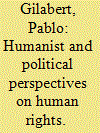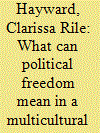| Srl | Item |
| 1 |
ID:
106418


|
|
|
|
|
| Publication |
2011.
|
| Summary/Abstract |
Current scholars generally view political obligations as "content independent." Citizens have moral reasons to obey the law because it is the law, rather than because of the content of different laws. However, this position is subject to criticism on both theoretical and practical grounds. The main consideration in favor of content independence, the so-called "self-image of the state," does not actually support it. Properly understood, the state's self-image is to comply with laws because of the underlying moral reasons that justify them, rather than because they are laws. Because content independence has played a central role in the widespread belief that a suitable theory of political obligation is not possible, rejecting it allows the possibility of a theory that establishes moral requirements for virtually all citizens to behave in accordance with virtually all laws, although these requirements are particular to different laws, and subjects are not required to obey them because they are laws.
|
|
|
|
|
|
|
|
|
|
|
|
|
|
|
|
| 2 |
ID:
106415


|
|
|
|
|
| Publication |
2011.
|
| Summary/Abstract |
This essay explores the relation between two perspectives on the nature of human rights. According to the "political" or "practical" perspective, human rights are claims that individuals have against certain institutional structures, in particular modern states, in virtue of interests they have in contexts that include them. According to the more traditional "humanist" or "naturalistic" perspective, human rights are pre-institutional claims that individuals have against all other individuals in virtue of interests characteristic of their common humanity. This essay argues that once we identify the two perspectives in their best light, we can see that they are complementary and that in fact we need both to make good normative sense of the contemporary practice of human rights. It explains how humanist and political considerations can and should work in tandem to account for the concept, content, and justification of human rights.
|
|
|
|
|
|
|
|
|
|
|
|
|
|
|
|
| 3 |
ID:
106416


|
|
|
|
|
| Publication |
2011.
|
| Summary/Abstract |
This essay takes as its starting point an apparent tension between theories of democratic deliberation and democratic theories of multicultural accommodation and makes the case that many multiculturalists and deliberative democrats converge on an ideal of political freedom, understood as nondomination. It argues for distinguishing two dimensions of nondomination: inter-agentive nondomination, which obtains when all participants in a power relation are free from rule by others who can set its terms, and systemic nondomination, which obtains when the terms of a power relation itself are responsive to those they affect. Because inter-agentive and systemic nondomination do not covary, it is critical to distinguish between them, in order to build institutions and practices that promote both.
|
|
|
|
|
|
|
|
|
|
|
|
|
|
|
|